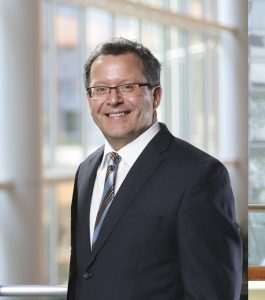David Agerter, M.D. (MED ’79, FM ’82)
Board Member, Executive Committee
(originally published in 2016)
Associate Professor of Family Medicine
Regional Vice President
Mayo Clinic Health System in Southeastern Minnesota
“The most important thing is to listen to patients. They’ve taught me more than I’ve taught them — about life and facing challenges.”
- Residency: Family Medicine, Mayo Clinic School of Graduate Medical Education
- Medical School: Mayo Clinic School of Medicine, Rochester, Minnesota
- Undergraduate: Gustavus Adolphus College, St. Peter, Minnesota
- Native of West Concord, Minnesota
Why did you decide to pursue medicine?
Growing up on a farm in rural southeastern Minnesota, I aspired to follow in my father’s footsteps and become a farmer. My parents were adamant that I receive the college education they never had. Perhaps largely due to a childhood connected to nature and many hours spent outside with animals, I found my collegiate science courses particularly interesting. My desire to give back coupled with mentorship from my own family medicine physician lead me toward a career in medicine.
Why did you train at Mayo Clinic?
I was always familiar with Mayo Clinic because when family members needed specialty care, they went to Rochester. I have a strong connection to the area where I grew up. The opportunity to train at a world-class medical facility and stay connected to the place I consider home seemed like a natural fit.
What was your initial impression of Mayo Clinic?
As a medical student in rotations, I commonly saw the attending physician contact colleagues with questions or concerns about patients. The team approach was always emphasized, and they modeled the concept that no single person has all the answers. Mayo Clinic has a wealth of resources, and it was always strongly encouraged to use those resources and colleagues.
How does Mayo Clinic influence your practice?
I look at Mayo as a values-based organization. Every day I come to work wanting to do the best for every patient. This is what draws people here and keeps them here even though they have opportunities to go elsewhere.
Mayo pays attention to details, including the little things that make a difference — how you greet a patient, interact with colleagues and dress to show respect for our patients.
What valuable lesson have you learned at Mayo Clinic?
The most important thing is to listen to patients. They’ve taught me more than I’ve taught them — about life and facing challenges. Many patients who have end-stage disease put their families before themselves by asking us to focus on their family members to make sure they’ll be OK.
What do you contribute to the Mayo Clinic Alumni Association?
I hope to work on projects of value and continue to make new relationships with those who have ties to Mayo Clinic. I enjoy reminiscing with fellow alumni and learning what aspects Mayo external alumni have taken to their organizations.
What do you do in your spare time?
I love spending time with my family and have a passion for sports. Recently much of my time has been spent with my first grandson, who lives in Colorado. My wife and I have four grown children. Traveling keeps us busy.
What would people be surprised to know about you?
I can play the Alpine horn. My father’s nationality was Swiss, and I played events and festivals in an Alpine horn quartet from age 10 to my early 30s. I still have my horn, which is about 12 feet long.
